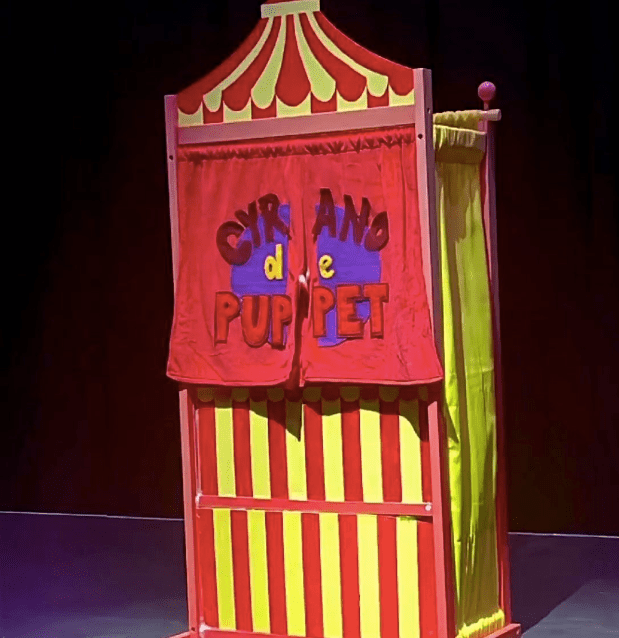Playing Puppet: Cyrano de Puppet Excels at Comedy, but Falters When it Tries to Turn to Something Serious
- Callisto Lodwick
- Oct 25, 2023
- 4 min read
Updated: May 20, 2024
As the audience flocked into the Barron at the Byre on a cold October night, the keen-eyed amongst them began murmuring with befuddlement. Dangling high above the Punch and Judy-esque puppet box that was the stage’s sole decoration was a solitary hand puppet. As the lights went down anticipation began to grow: when would Chekhov’s puppet make its mighty appearance? As luck would have it, we would have to wait for the play’s very end to reach an answer. Yet in the meantime, Cyrano de Puppet provided a delightful student play awash with comedy, though one that sadly begins to falter during its heavier second act.
Before we go any further, I have an unfortunate confession. Despite the narrator (Louise Windsor)’s assumptions at the play’s opening, I had never seen a production of Cyrano de Bergerac before the puppet-size curtain rose for Puppet. Since I knew almost nothing of the plot that a short puppet show at the play’s opening didn’t summarise, I was perhaps not the best choice to understand the nuances of an adaptation. Going in blind, however, enabled me to approach Cyrano de Puppet with a set of fresh eyes – and I found a play remarkably approachable to Edmond Rostand-newbies. The jokes come fast and heavy, and the only plot point that in my opinion remained obscure was the reason the lead Cyrano is supposed to be so ugly: allegedly, he has a massive nose. Unfortunately (or rather fortunately, for the actor), Thomas Scott, who plays Cyrano, has a nose of normal size; thus, a major point of the original story is somewhat lost.

Source: Cyrano de Puppet.
Cyrano’s nose, however, isn’t actually quite as much of an issue in this adaptation than the original, replaced instead with the dilemma of ‘is it better to be a handsome puppet or an ugly man?’ In an attempt to make the play a little less incestful and less objectifying, Cyrano’s love for Roxanne isn’t as expressed as fully as in the original. His objective in writing the letters for Christian is to make Roxanne happy in her love for Christian; he relinquishes the woman early on without any hope of getting together with her. Instead, it is Christian and Roxanne’s happiness he seeks to further. The narrative choice makes Cyrano a more noble figure, but does a disservice to the character as it does: it is not quite as fun a romp as it could have been than if Cyrano were less morally upstanding. Indeed, the highlights of the show are when the characters are being morally reprehensible: Mackenzie Galbraith’s lovably loathsome De Guiche is a scene-stealer the minute he steps onstage, and Scott’s Cyrano is at his best when he’s making wisecracks as he duels wildly onstage. The same is true for most of the characters: Ligniere (Eilidh Read)’s witty quips at the audience in the opening scenes make her absence in the rest of the play all the more mournful, while the ensemble frequently drew a laugh with their slapstick humour.

Source: Cyrano de Puppet.
It is all the more unfortunate, then, that with Cyrano’s moral turn comes a major decline in mood and momentum. Much of the second act marks a whiplash from the easy-going comedy of the opening to a bitter reflection on love and death. De Guiche is made pathetic, Lewis Fitez’s Christian deeply sympathetic, and Cyrano deeply tragic. Even Roxanne (Piper Richardson) gets a long monologue reflecting on her feelings. Unfortunately, this sober turn is nowhere near as entertaining or original as the first act. Kilda Kennedy’s skill as a playwright clearly lies in humour: when it comes to messages like ‘war is hell’ or ‘women don’t like to be deprived of agency’, it’s all material that the audience has seen endlessly re-trod time and time again. Cyrano entraps the audience with its jokes and fun; it loses them as it tries to make sweeping statements that ultimately feel trite. The play even seems to know this itself: after the grand finale, it makes a last-ditch attempt to return to comedy with the appearance of the puppet-ex-machina that so tantalisingly dangled on the ceiling before the curtain rose.
Cyrano de Puppet’s great stab at originality lies in its puppet cast: it takes an Avenue Q approach to metaphor as it casts Christian, the one who delivers Cyrano’s letters to Roxanne under his own name, as the ultimate puppet by having him played by one. The effect is well-done, especially under an excellent puppeteer: Christian becomes a real character under Fitez’s hand. The other appearances of puppets in the show are far more superfluous: they appear as comic relief, sometimes in hilariously strange moments. The puppet show feel greatly contributes to the comic atmosphere, and puppet-sized props and gags always result in a good laugh.
So should you see Cyrano de Puppet? That depends: do you like student comedy and excellent character acting enough to sit through half an hour of somewhat dull speeches afterward? For some, the answer will be yes. For others, including several of the audience members at opening night, interest will quickly be lost in favour of fervent whispering and laughter at what is intended to be the most dramatic moments – to their credit, the cast kept their cool under this pressure very well. Cyrano de Puppet is a good start at comedy from a student playwright, but not taking the opportunity to remove the more monotonous elements from Rostand’s fin-de-siècle original seems a great missed opportunity.

Comments